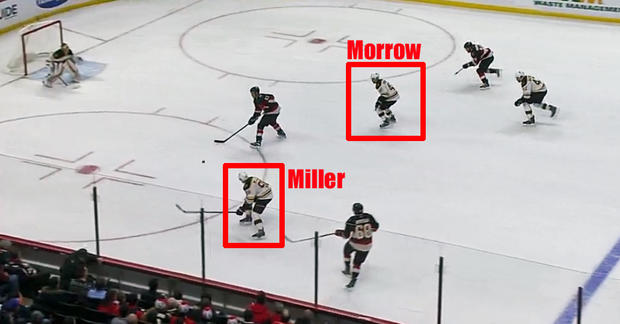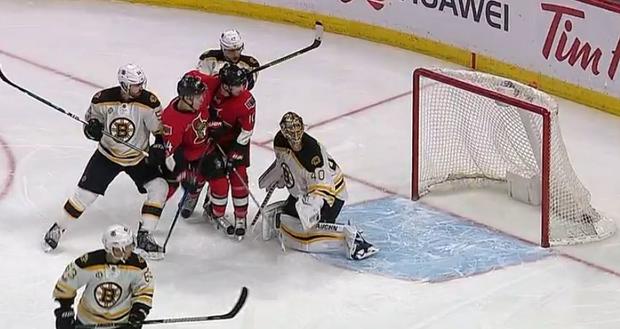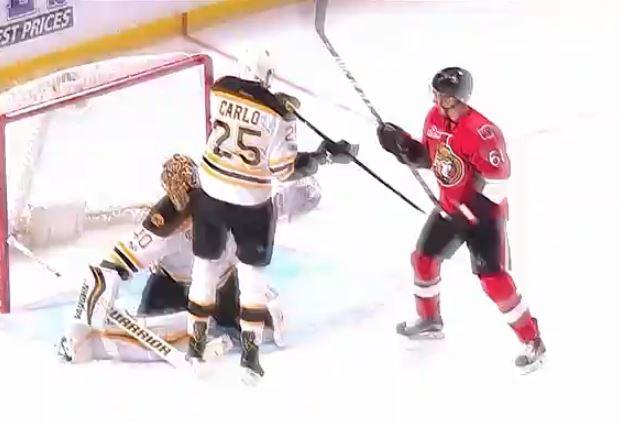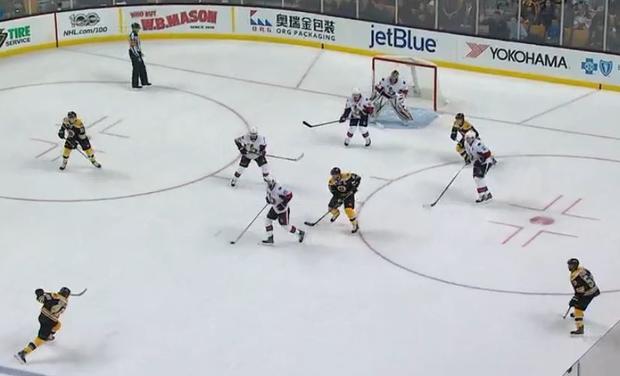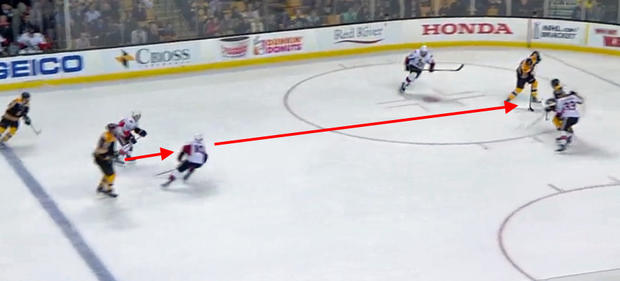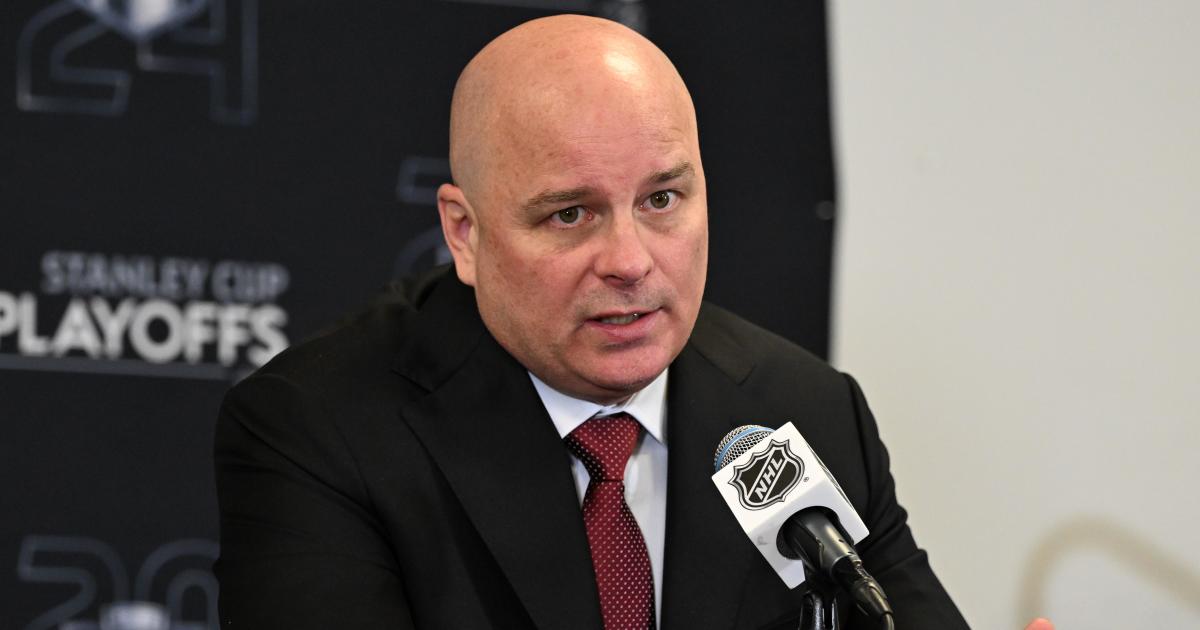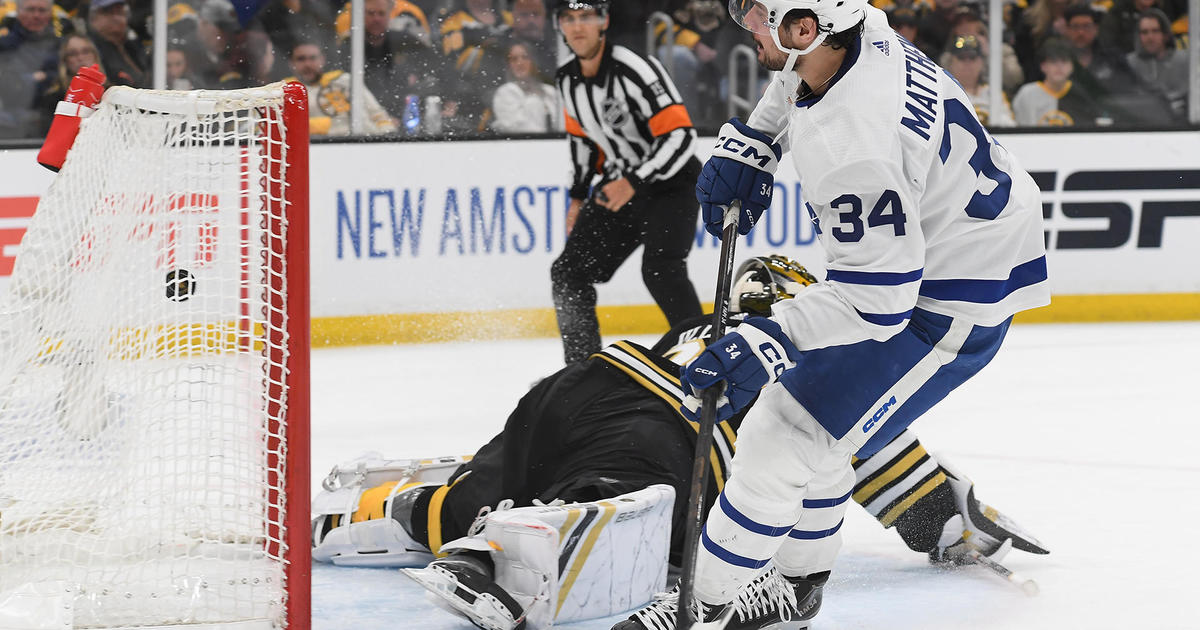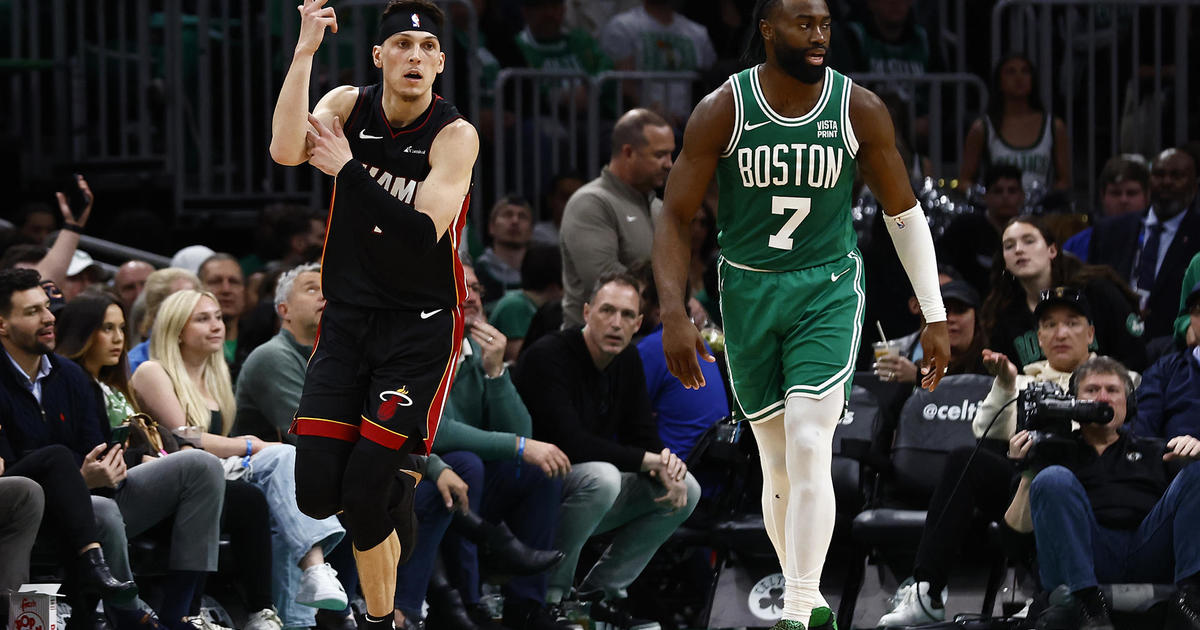Breaking Down Bruins' Four Games With Senators This Season
By Michael Hurley, CBS Boston
BOSTON (CBS) -- When the Toronto Maple Leafs failed to pick up a point in their regular-season finale on Sunday night, the immediate reaction from Bruins writers and fans was swift and unanimous: The Bruins had just caught a major break.
And, make no mistake, they had. By virtue of winning the tiebreaker in the standings with Toronto, the Bruins secured themselves the No. 3 seed in the Atlantic Division, setting up a first-round matchup with the Ottawa Senators and -- more importantly -- avoiding a first-round date with the Washington Capitals. Considering the Bruins went 0-2-1 vs. Washington this year, outscored 12-7, and considering the Bruins are 0-7-2 in the past three years against the Capitals, it makes sense why the sentiment of the Bruins' catching a break existed.
But still, the point may have been overstated, because the Bruins over the past two years have found just about the same success vs. Ottawa as they have vs. Washington.
This year, the Bruins went 0-3-1 against Ottawa. Three of those games took place between March 6 and April 6, so they're not exactly a part of ancient history. And even going back to the 2015-16 season, when Dave Cameron was head coach, the Bruins are 1-5-2 and have been outscored 25-16 in the past eight meetings.
So, heading into a seven-game series, history doesn't favor the Boston Bruins much. But of course, in this crazy sport played with a rubber disc by large men on a sheet of ice, there's no such thing as "a sure thing" for any team. And with that in mind, here's a quick glance back at the four regular-season meetings to look at the dynamics of each game and see how each was won.
Nov. 24, 2016: Canadian Tire Centre
Bruins: 1
Senators: 3
The Bruins were off to a so-so start at 11-8-0 when they made their first trip of the year to Ottawa, where the 11-7-1 Senators were waiting. The Bruins took a lead in the final minute of the first period, when David Pastrnak displayed some nifty mitt work to bury a loose puck on the power play.
But that would be the Bruins' only goal of the night. In fact, after that goal, they'd generate just 14 total shots over the final 40 minutes. They finished the night with just 20 shots on goal.
The Bruins themselves had, for the most part, a very solid defensive effort, limiting Ottawa to just 16 shots over the final 40 minutes. However, a very bad breakdown by the defensive pair of Joe Morrow and Kevan Miller allowed Mark Stone to fly through the uprights ...
... and go on to score the game-tying goal.
Morrow hasn't skated in an NHL game since Jan. 22, so such a pairing won't be seen in this series. This was also Miller's first game of the season, and he clearly was not playing at an NHL speed on that goal.
In the third period, what proved to be the game-winning goal was due in part to a weak clearing attempt by Torey Krug and in part due to the bad luck of a bounce off Dominic Moore's shin pad.
In a game with so few shots on net, it took that ricochet to net the game-winner.
The Senators later added another goal for good measure, thanks to a dreadful no-look drop pass to nobody by David Krejci and then a defensive breakdown by Adam McQuaid and Krug.
Claude Julien blasted his team after the loss, which was their second straight and third in four games.
"I think the whole game there was poor puck management in my estimation. We've been a better team than that. It's disappointing tonight in an important game like this we came out with one of worst efforts in probably a month," Julien said. "I didn't like our game tonight, decision making, puck management, I would say there were a lot of no shows, as well. Those are things that can't happen in these kind of games. Definitely not happy with not just the outcome, but our team. Definitely we need to be better."
It was, without a doubt, a bad game for Boston, though it must be noted: Zdeno Chara did not play in this game. While the Bruins' captain has not always been a perfect player 100 percent of the time in his age 40 season, he has been their best defenseman.
March 6, 2017: Canadian Tire Centre
Bruins: 2
Senators: 4
The Bruins had been riding that sweet, sweet "Cassidy Magic" to the tune of an 8-2-0 record under their new head coach when they made their way back to Ottawa. The Senators were not impressed.
It took all of 81 seconds for the Senators to take a lead on their first shot of the night. It was an odd one, as the puck had bounced high into the air before coming down to the ice. Derick Brassard took it back to the blue line and sent a soft, low shot through traffic toward the net. With Brandon Carlo checking Stone to the ice in front of the net, Rask never saw the puck as it made its way past him.
A little more than two minutes later, on the Senators' second shot of the night ... they scored again.
Rather than clearing the front of the net, McQuaid and Krug added to the traffic jam in front of Rask.
Brad Marchand's clearing attempt didn't make it past Dion Phaneuf, who sent a shot toward the mess of bodies to lead to the goal.
Late in the first period, the hard work of Patrice Bergeron, Brad Marchand and Krug in the offensive zone resulted in a Bergeron goal to cut the lead in half, but the Senators dominated play in the second period. Boston mustered just five shots on goal in the second period, while the Senators piled on 16 of their own.
Midway through the third, with David Pastrnak in the box for a high stick, Carlo ended up in a position that it made it awfully tough for Rask to stop a Mike Hoffman slapper.
That's not what you're looking for out of your D-man, but things happen to rookies.
Marchand later scored in the third on a power play, when a Craig Anderson rebound presented the winger with an empty net. But in the final 11 minutes of the game, the Bruins managed just four shots on net; they came from an average of 38 feet from the net, none closer than 22 feet.
Old friend Alex Burrows scored an empty-netter to ice the victory.
Bruce Cassidy described the Bruins as being "stubborn" during the game, and Marchand agreed.
"We kind of played into their system," Marchand said. "We didn't get enough pucks in deep and that's the game you have to play against this team -- with the five guys in the neutral zone they really clog it up, so we have to get in a little bit more than we did and hopefully we can do a little bit better next game."
On the flip side, Hoffman spoke to the significance of the win from Ottawa's perspective.
"That was one of the toughest games we've played all year," Hoffman said. "For the whole 60 minutes we had to be sharp, we had to be on our toes. I thought everyone played sharp."
As it relates to the upcoming playoff series, this comment from Marchand is sure to be relevant: "It was tough to battle back when you play against a team that sits back like that. They don't give up a lot of odd-man rushes or opportunities off the rush. It makes it tough to battle back."
March 21, 2017: TD Garden
Senators: 4
Bruins: 2
The Bruins had just lost two straight -- the 7-4 clunker in Edmonton and a 4-2 loss in Toronto -- and were hoping to have a big response upon their return to home ice. The Senators, on a four-game losing streak, looked to be vulnerable. Alas, they were not.
This time the Senators waited all of four minutes before scoring, this time on a Cody Ceci blast that pinballed off Tom Pyatt's shin pad and both of Colin Miller's skates before finding a path through Rask.
A hush came over the Garden crowd, though some life returned later, when David Krejci benefited from the script flipping and the Senators screening their goalie on a power-play blast from the point:
The Senators reclaimed the lead on a power-play goal with Bobby Ryan planted in front of Rask and Brandon Carlo seeming to deflect a Kyle Turris shot past Rask.
Unlike in previous meetings, the Bruins actually dominated play in the second period, getting 18 shots on net. But they had nothing to show for it.
The third period begin with Torey Krug scoring one of the best goals of his career to tie the game in Orr-like fashion.
But the tie didn't last long, as Turris redirected a Dion Phaneuf shot from the high slot in absolutely beautiful fashion.
That was, simply, a marvelous hockey goal.
The Senators held on for the win, with Anderson making eight more saves the rest of the way. The Bruins' loss brought back many of the feelings of dread in the area that tend to linger following two straight late-season collapses. A loss two nights later vs. Tampa would bring the city to a near-panic before the Bruins righted the ship with six straight wins.
April 6, 2017: TD Garden
Senators: 2
Bruins: 1
(Shootout)
The Bruins were riding that high of the six-game winning streak when the Senators came back to town. Ottawa had just won in Detroit after losing five straight and appearing to be sliding out of the Atlantic playoff field and into the fray of the wild card. The game certainly had a playoff feel to it, and the defensive effort from both sides reflected that level of focus.
The first period was somewhat loose, with the Bruins getting 14 shots on net and the Senators getting 10. But after that, Ottawa allowed just 10 shots for the remainder of regulation while the Bruins allowed just 14.
The Bruins got their only goal of the night on the power play, when Zdeno Chara prevented a clearing attempt from getting to the neutral zone before firing this pass ...
... to Drew Stafford, who scored on a wraparound.
The Senators got their goal when Adam McQuaid didn't get much muscle behind a clearing attempt. Alex Burrows fired a slapper on net, where there was -- surprise surprise -- traffic in front of Tuukka Rask.
Kyle Turris was the lone scorer in the shootout for both teams, and the Senators were able to clinch a postseason berth on Boston's home ice.
Of note: Erik Karlsson did not play in this game.
TAKEAWAYS
It's now the postseason, which means the regular-season events should not necessarily be considered a harbinger of things to come. Yet, given how three of these games happened within the past month or so, the lessons learned can still be applied.
With that being said, here are the main takeaways from the four meetings.
1. Ottawa's offense is almost entirely reliant on traffic in front of the net.
This is, frankly, not all that uncommon in today's NHL, where beating frontline goaltenders typically requires screens and tips. But when you look at all 11 goals scored by the Senators vs. the Bruins, seven of them came either via deflection or screen in Rask's face.
Clearly, that's how Ottawa hopes to score vs. Boston, and it'll be up to the Bruins' defensemen to really get strong in front of their own crease to prevent that kind of traffic from piling up in front of Rask. It is the playoffs, so some extra physicality might be allowed from the likes of Chara, McQuaid and Miller.
2. Boston's offense is almost entirely reliant on the power play.
This is just a bit nutty, but of the six Bruins goals scored vs. Ottawa, five of them came on the power play. That means that in 5-on-5 play, Craig Anderson stopped 94 of the Bruins' 95 shots.
That bears repeating: The Bruins have scored one goal on 95 even-strength shots against Craig Anderson this season.
That does speak well to the Bruins' power play and also doesn't reflect well on Ottawa's penalty kill, but relying on the power play to score more than 80 percent of a team's goals is not really a reliable plan.
It's been stated nearly 17 million times already, but the Bruins really need to figure out a way to solve that neutral zone trap when the teams are playing five-a-side to really make this a series. They've proven to be able to score when just four Senators are on the ice, but they're not guaranteed to have those opportunities in this series.
On the other side, discipline will be of the utmost importance for Ottawa. The Senators ranked 22nd in the NHL with a 79.7 percent kill rate, and if they do lose this series, that figures to be a likely culprit.
3. Comebacks won't be easy for Boston.
Brad Marchand said it plainly: It's simply not easy to fight back out of a hole against the Senators. Ottawa's structure is just too rigid to break, thereby limiting most opponents' opportunities to shots from the boards or the blue line. It's difficult to generate odd-man rushes when the neutral zone is so clogged, and if their best breakout pass artist in Torey Krug remains out for multiple games or the entire series, slicing through that type of defense will only prove more challenging.
The Bruins did come back to tie the game twice in that March 21 meeting, but -- adding credence to takeaway No. 2 -- both Boston goals came on the power play.
Scoring early is always important, but when facing a team like Guy Boucher's, it's all the more vital.
You can email Michael Hurley or find him on Twitter @michaelFhurley.
